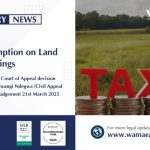INTRODUCTION
On 11th December 2020, President Uhuru Kenyatta signed the Sectional Properties Act, 2020 into law repealing the Sectional Properties Act, 1987.
The Sectional Properties Act, 2020 mainly simplifies the process of registering sectional properties in Kenya. It provides for, inter alia, the division of buildings into units to be owned by individual proprietors who will have individual titles for their respective units.
The Sectional Properties Act, 2020 applies in respect of land held on freehold title or on leasehold title where the unexpired residue of the term is not less than twenty-one (21) years and there is an intention to confer ownership.
Below are some of the Salient Provisions of the Sectional Properties Act, 2020:
OWNERSHIP OF UNITS
Section 3 of the Sectional Properties Act, 2020 (hereinafter referred to as “the Act”) defines a unit as a space that is situated within a building and described in a sectional plan and includes a proportionate share in the common property.
Ownership of a unit is conferred once the sectional plan with respect to the building in which the unit is situated is duly registered at the Land Registry.
A sectional plan is prepared by a surveyor from a building plan that has been duly approved by a County Government. A surveyor is only required to prepare a sectional plan after he or she is presented with proof of ownership (i.e. Original Title Deed, Certificate of Title, or Certificate of Lease) of the parcel of land on which a building is to be erected.
For common property comprised in a registered sectional plan, the Act provides that it is to be held by the owners of the units as tenants in common in shares proportional to the units owned. The Sectional Properties Title Deeds include the owner’s respective share(s) in the common property.
REGISTRATION OF SECTIONAL PLANS
A registrable sectional plan ought to describe two or more units and is to be presented to the Land Registrar in quadruplicate.
Section 4(3) of the Act provides that a sectional plan ought to be accompanied by an application for registration of a Corporation and a list of the owners of the units, which list can be updated from time to time.
Once a sectional plan is registered, the registrar is required to close the register of the parcel described in it, open a separate register for each of the units described in the plan and issue a certificate of title if the property is freehold or a certificate of the lease if the property is leasehold in respect of each unit of the sectional property and its proportional share in the common property. The common property comprised in the title shall be held by all the owners of the units as tenants in common in shares proportional to their units.
As soon as a sectional plan is registered under the Sectional Properties Act, the title relating to the unit once registered shall be deemed to have been issued under the Land Registration Act 2012 (No. 3 of 2012) and any further dealings relating to the unit shall be subject to the said Act.
MANAGEMENT OF SECTIONAL PROPERTIES BY CORPORATIONS
A Corporation is automatically registered upon the registration of a sectional plan.
Section 17 of the Sectional Properties Act, 2020 requires owners to register a Corporation name as follows: “The Owners, Sectional Plan No. ______ (the number given to the sectional plan on registration)”.
The Corporation consists of the owners of units to which the sectional plan relates or persons who are entitled to the parcel when the sectional arrangement is terminated under the Act.
The Corporation has perpetual succession and a common seal and is regulated in accordance with the Act. It is worth noting that the Corporation shall not be subject to the Companies Act, 2015.
The duties and powers of the Corporation are extensively set out in section 20 of the Act. However, and notably, any dealing or disposition affecting the common property must be approved by a unanimous resolution of the Corporation.
INSURANCE OF THE UNITS
Section 17 of the Sectional Properties Act, 2020 provides that where a sectional plan has not been registered prior to the sale of any units, the developer is required to ensure the units and the common property against the following:
- loss resulting from destruction;
- damage caused by fire;
- damages awarded against the developer, the owner, or the Corporation in an action for occupier’s liability; and
- other such perils.
However, upon the registration of the sectional plan, the Corporation is mandated to ensure the units and the common property.
CONVERSION TO UNITS
Section 13 (1) of the Act provides as follows:
If a building contains premises that are rented for residential purposes to a tenant who is not a party to a purchase agreement and not included in a sectional plan, the owner of the premises shall not sell those premises as a residential unit until the sectional plan that includes those premises is registered at a registry.
By dint of the provision above, an owner of premises rented for residential purposes and not included in a sectional plan is required to register the sectional plan that includes those premises prior to selling the premises to a Buyer.
Suffice to say that the above section pre-supposes the existence of a sectional plan that is not registered and requires the same to be registered prior to the sale of premises.
Section 13 (2) of the Act further provides as follows:
All long-term subleases that are intended to confer ownership of an apartment, flat, maisonette, townhouse, or an office that was registered before the commencement of this Act shall be reviewed to conform to Section 54(5) of the Land Registration Act, 2012 within a period of two (2) years from the date of commencement of this Act.
Further to the foregoing, Section 54(5) of the Land Registration Act, 2012 provides as follows:
The Registrar shall register long-term leases and issue certificates of lease over apartments, flats, maisonettes, townhouses, or offices having the effect of conferring ownership if the property comprised is properly geo-referenced and approved by the statutory body responsible for the survey of the land.
By a dint of the sections above, long-term subleases that were registered before the commencement of the Sectional Properties Act, 2020 are required to be registered in compliance with Section 54(5) of the Land Registration Act. The registrar is required to confer the lessee’s certificates of lease over the apartments, flats, maisonettes, townhouses or offices in order to confer ownership.
The above process may be initiated by a developer, a management company, or the owner of the unit and if not done within the prescribed period, the Registrar shall register a restriction against the title of the parcel to prevent any further dealings on it.
The Act further provides that owners will not incur additional stamp duty with respect to the above if they paid the requisite stamp duty fees when registering their sub-leases.
TERMINATION OF SECTIONAL PROPERTIES
Section 47 of the Sectional Properties Act, 2020 provides that the sectional status of a building may be terminated by a unanimous resolution of the Corporation, substantial or total damage to the building, or compulsory acquisition. The Corporation is mandated to file a notice of termination with the registrar in the prescribed form to effect the termination.
Once the sectional status of a building is terminated, the owners are entitled to the parcel of land on which the building is erected as tenants in common in shares proportional to their respective units.
Section 50 of the Sectional Properties Act, 2020 further provides that the Corporation shall automatically stand dissolved upon the termination of the sectional property.
CONCLUSION
From the foregoing, it is noteworthy that in accordance with section 54 (5) of the Land Registration Act, the Registrar is required to register long-term leases and issue a certificate of leases over the units.
However, the above is contrary to the recently issued notice of 9th May 2021 where the Ministry of Land notified the public that long term leases prepared on the basis of architectural plans will no longer be registered with effect from 10th May 2021 and further that the Lands Registry shall no longer register long term leases for units.
As it stands, it is unclear how the transition and registration of sectional properties shall be undertaken from a practical perspective because:
- The Sectional Properties regulations and guidelines are yet to be finalized as the same is at the public participation stage; and
- The Sectional Properties Act does not amend the provisions of the Land Registration Act regarding dealings of long-term leases.
The effect of the above is that there shall be a hindrance to land transactions, thus suppressing investments and capital commitments due to the delays that we anticipate shall arise in property transactions where ownership is to be conferred by way of long-term leases and for financing transactions where the security is a new long-term lease over the units.
Further implementing the provisions of the Act will be difficult as the regulations and guidelines intended to ensure a smooth transition of processes under the Act are yet to come into force.
We are also consulting with the Ministry of Lands and various stakeholders on the way forward and note to apprise you of any new developments.















